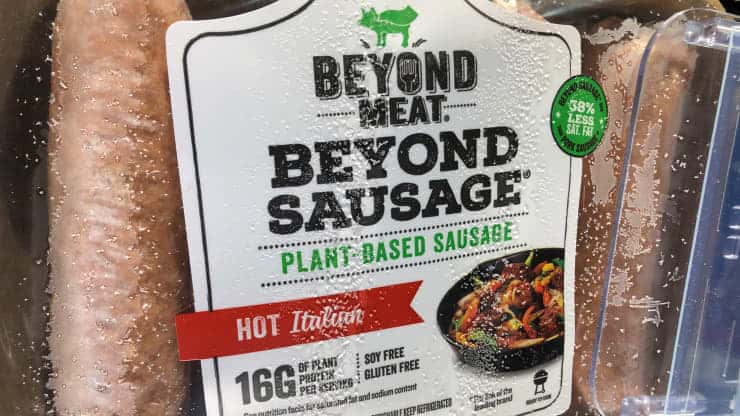
Beyond Meat on Thursday lowered its revenue forecast for the year and announced it will trim its workforce by 4%, citing broader economic uncertainty and consumers trading down to cheaper proteins.
The El Segundo, California-based company also reported a wider-than-expected loss and weak sales for the second quarter. Its shares fell 1% in extended trading.
Here’s what the company reported compared with what Wall Street was expecting, based on a survey of analysts by Refinitiv:
- Loss per share: $1.53 vs. $1.18 expected
- Revenue: $147 million vs. $149.2 million expected
Net sales dropped 1.6% to $147 million. The company attributed the decline to changes in foreign exchange rates, increased discounts and sales to liquidation channels.
“We recognize progress is taking longer than we expected,” CEO Ethan Brown said in a statement, referring to the company’s push into mass market consumption with plant-based products that mimic meat.
Beyond’s meat substitutes are typically more expensive than traditional meat, but the company is seeking to achieve price parity in the near future. With consumers pressured by inflation, Brown said Beyond customers are switching to cheaper private label meat alternatives or back to traditional meat.
For 2022, Beyond now expects revenue of $470 million to $520 million, down from its prior forecast of $560 million to $620 million. The company said inflation, rising interest rates and growing concerns about a recession were among the factors that drove the revised outlook.
Beyond executives specifically pointed to weaker sales for Beyond Jerky, its broader U.S. grocery business and in Europe and the Middle East.
As part of a push to spend less of its cash, Beyond said it will lay off about 4% of its global workforce, which is expected to save about $8 million on an annual basis. However, the company will also spend roughly $1 million in separation costs that will impact its third-quarter results.
For the second quarter, Beyond Meat reported a net loss of $97.1 million, or $1.53 per share, wider than the net loss of $19.7 million, or 31 cents per share, a year earlier. The company said it spent more on ingredients and manufacturing this quarter. Moreover, its meatless Beyond Jerky, made through a joint venture with PepsiCo, weighed on profit margins for the second consecutive quarter.
U.S. grocery sales rose 2.2% in the quarter, offsetting a 2.4% decline of its restaurant business. Prior to the pandemic, restaurants accounted for more than half of its sales, but the business has struggled to bounce back.
Outside the U.S., grocery sales fell 17%, while restaurant sales increased 7%. The two international divisions generally contribute roughly equal revenue for Beyond.